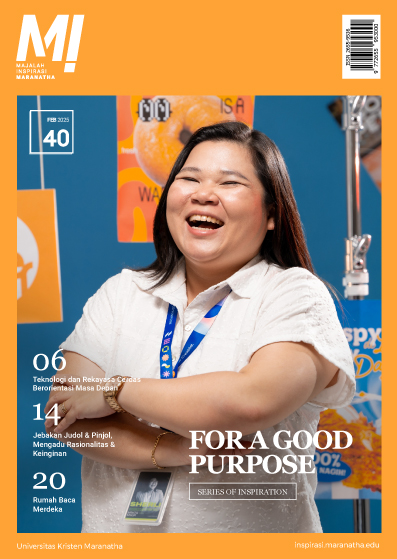The livestock business, especially poultry, experienced a crisis that lasted quite a long time and disturbed business actors during the pandemic. Eggs and chicken meat in some parts of Indonesia have increased post-Eid, presumably due to the soaring price of animal feed. This condition needs serious attention from many parties such as breeders, distributors, government, and academics.
To motivate and inspire livestock business actors in Indonesia, the Faculty of Business at Maranatha Christian University continued the webinar series “How to Survive in Crisis" on Friday, June 4, 2021. The second session of the online community service activity (PKM) was aimed at distributors of livestock products in Indonesia to be ready and agile in the face of a challenging pandemic period. The invited speakers are lecturers from FB UK Maranatha who have academic expertise in their fields.
More news Faculty of Business: “How to Survive in Crisis” Webinar
Maya Malinda, S.E., M.T., Ph.D. as the first speaker discussed tips for dealing with crises and getting to know business model strategies that can be applied and adapted in business. Maya said that the business model canvas can be used by business actors to analyze the business, correct what was wrong, and direct it in a more positive direction. “This business model which has nine components helps us explore the business model that has been done, what needs to be updated or adapted so that we can survive the crisis,” explained Maya.
The second speaker, Dr. Benny B. Tjandrasa, S.E., M.M., spoke about the handling of accounts payable. Benny said that financial planning is important for business actors, including distributors of livestock products, to reduce the risk of maturing debts and debts that are in arrears. For example, to reduce bad debts, it is necessary to increase demand compared to supply. The trick is to make the product more innovative, unique, have attractive promotions, good negotiations with suppliers, and there must be a safe image for consumers.
“In Roman history there is the term 'si vis pacem, para bellum', meaning if you want peace, then prepare yourself for war. That is, we must have a strong position and influence to create peace in business. If our position is weak, then we can be annexed by a stronger one. So if suppliers, distributors, and customers are strong, there will be a balance, and eventually a blue ocean strategy will occur. There is no fighting, there is only mutual respect,” said Benny.
Planning was also an important point emphasized by the third speaker, Dr. Drs. Jahja Hamdani Widjaja, M.M. Jahja said that good planning shows the anticipatory attitude needed to deal with the crisis. “In principle, a business is an entrepreneur who will look at consumers or the market in order to look for opportunities, find out what is needed, what the problems are for consumers, and what things match the expertise that can be offered to the market. As distributors, we will of course face diverse consumers,” he said.
He also added that planning through estimation will help train and hone foresight, increase knowledge, and help identify business opportunities and threats. “By recognizing consumer behavior and conditions, it will help to recognize our business. Knowing consumers and our business will be the basic capital in making plans or anticipatory actions,” said Jahja. (sg/gn)
Photo: doc. Faculty of Business PKM Committee via Zoom



